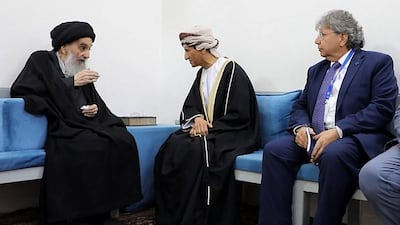Iraq’s most senior and revered Shiite cleric Grand Ayatollah Ali Al Sistani issued a powerful call on Monday for profound reforms to address the hardships that have plagued the country for decades.
During a meeting with Mohammed Al Hassan, the head of the UN Assistance Mission for Iraq, Mr Al Sistani laid out the urgent need for competent, corruption-free governance, the rule of law and curbing foreign interference to put Iraq on the path to stability and prosperity.
He underscored the “significant challenges that Iraq currently faces and the various hardships endured by its people,” a statement issued from his office after the meeting read. He also urged Iraqis and “particularly the conscious elite” to “draw lessons from past experiences, exert maximum efforts to overcome previous setbacks and work diligently to achieve a better future for their country in which all enjoy security, stability and prosperity”, it added.
Despite the relative stability, and the government's plans to improve services, and introduce financial and economic reforms, Iraq's Prime Minister Mohammed Shia Al Sudani has so far failed to rein in Iran-backed militias who have expanded their operations to Israel since the October 7 Hamas attack last year and the ensuing war.
That involvement, in the form of launching drone and missile attacks almost on a daily basis, has threatened to drag Iraq into the conflicts, particularly after media reports this month suggested Iran may use Iraqi territory to launch a retaliatory attack on Israel.

Mr Al Sistani called for a system that is based on “competence and integrity in assuming positions of responsibility, preventing all kinds of foreign interference, boosting the rule of law, ensuring the weapons in the hands of the state and fighting corruption”.
However, he cautioned that “Iraqis still have a long path ahead to achieve this. May God help them in it.”
The meeting, which took place in Mr Al Sistani's home in the revered Shiite city of Najaf south of Baghdad, also touched on the wars in Gaza and Lebanon. He voiced deep anguish over the crisis affecting both due to Israeli military operations.
“His Eminence expressed his deep sorrow over the ongoing tragedy in Lebanon and Gaza,” added the statement, criticising the international community for its “inability to enforce effective solutions” to stop the violence or protect civilians from what he described as “horrific aggression” by Israel.
Last month, Channel 14, a right-wing Israeli broadcaster, displayed images of six Iranian and pro-Iran figures, including supreme leader Ayatollah Ali Khamenei, Hamas leader Yahya Sinwar before he was killed in clashes with Israeli troops and Mr Al Sistani with crosshairs on their heads, implying that they were potential targets. The move drew condemnation from inside and outside Iraq.
The head of the UN assistance mission, Mr Al Hassan, said after the meeting “we categorically reject any disrespect and threat towards the religious authority, given the symbolism and respect it carries in this country and the entire world".


